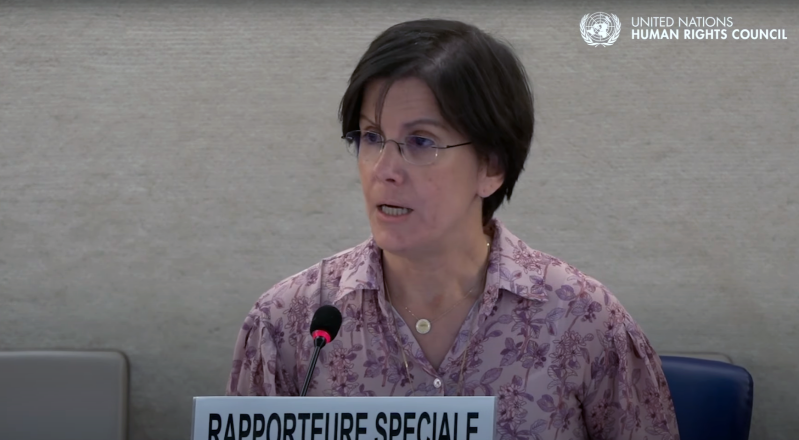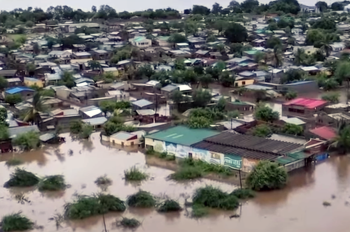
A United Nations human rights expert has issued a stark warning that the erasure of biological sex in international policy and discourse is causing grave harm to women and girls, weakening protections against gender-based violence and silencing those who defend sex-based rights.
In a detailed report presented to the 59th session of the UN Human Rights Council in June, Reem Alsalem, the UN Special Rapporteur on violence against women and girls, called for a return to foundational legal principles that recognize the female sex as central to understanding and combating violence and discrimination.
“The consequences of this blatant disregard of the material reality of sex have been devastating,” Alsalem told the Council during her oral statement in Geneva. “The erosion of women and sex-specific language, the conflation of sex, gender, and gender identity have produced flawed data, overall weakened protections for motherhood, women and girls—including lesbians—as well as women who do not identify as women and girls who may be experiencing gender dysphoria.”
A definitional crisis with real-world impact
At the heart of Alsalem’s report (A/HRC/59/47) is the assertion that the shift away from clear, sex-based language in law, policy, and service provision is undermining the very tools needed to protect women and girls from violence.
Citing mounting evidence and testimonies from across the globe, she noted that the failure to define “woman” and “girl” in relation to biological sex is leading to confusion in data collection, weakening the ability of governments and agencies to track, analyze, and respond to gender-based violence.
“Simply put, you cannot protect what you cannot define,” Alsalem told delegates. “To make this point clear, I have included in the report emerging or overlooked forms of violence that women and girls specifically experience because of their female biological sex.”
Among the examples cited are suicides linked to domestic violence, reproductive coercion, femicide used as a tool of genocide, and digitally facilitated sexual exploitation. These forms of violence, Alsalem said, are often mischaracterized or overlooked entirely when sex-based distinctions are ignored.
Backlash and vilification
Alsalem also lamented the personal backlash she has received for her work on this issue and highlighted that she is not alone in being vilified by those denying simple biological facts.
“I never imagined the day would come where my mandate would deem it necessary to prepare a report affirming that the words ‘women’ and ‘girls’ refer to distinct biological and legal categories,” she said. “Several influential actors actively lobbied others not to engage with the call for input for this report.”
Since publishing her preliminary findings, Alsalem said she has been labeled “regressive, racist, colonial, transphobic, fascist, and Nazi” by critics. But she made clear that she is not alone in facing such attacks.
“In recent years, I have received concerning reports from countless women and girls and their allies, in which they detail how they have been vilified, ostracized, threatened, and attacked for arguing that sex and sex-related data matter in the analysis of discrimination and inequality,” she said.
“Scientists and biologists have been attacked for asserting what science tells us—that sex is as binary as it gets and that it is real. Medical doctors, politicians, whistleblowers, and women human rights defenders have received death threats for pointing out the harms of socially and medically transitioning vulnerable children.”
A call to return to basics
While the report acknowledges the complexity of gender-related debates, it ultimately argues for a reaffirmation of international legal norms that recognize biological sex as the basis for protections against gender-based violence.
“What I’m proposing in my report is very simple yet necessary,” Alsalem said. “That we go back to basics. That we reclaim the meaning and relevance of sex. That we stop conflating terminologies such as sex, gender, and gender identity.”
Her report urges states to take several steps to restore clarity and strengthen protection for women and girls, such as using precise and consistent definitions of sex and gender in legislation; requiring sex-disaggregated data collection in all areas of policy; ensuring that services for survivors of gender-based violence are sex-specific and trauma-informed; and safeguarding the rights of girls with gender dysphoria by ensuring that their care is evidence-based and prioritizes long-term well-being.
She also called for a standardized international framework for defining “consent” in cases of sexual violence, noting divergent legal interpretations that risk failing victims.
Support from Christian advocacy group
The report has drawn praise from some international human rights advocates, including Alliance Defending Freedom (ADF) International, which has been active at the UN defending the rights of women and children under international law.
“This report delivers a timely and urgent message as international awareness solidifies around the dangerous human rights implications of gender ideology, especially its impact on the well-being and healthy development of children,” said Giorgio Mazzoli, Director of UN Advocacy at ADF International.
“The report underscores how the erosion of legal clarity around sex—an objective and immutable biological reality—has had devastating implications for the dignity, safety, and rights of women and girls. As the Special Rapporteur told governments at the UN Human Rights Council today, ‘you cannot protect what you cannot define’. We urge all States to act without delay to implement the report’s recommendations.”
Continued resistance from UN circles
Alsalem acknowledged in her presentation that her position is deeply unpopular in some UN and international policy circles. She described attempts by unnamed organizations and government actors to discredit her work and pressure others not to engage with her mandate.
“The visceral reaction I received from some corners in response to this work single-handedly proved the necessity of this report,” she said. “Those that felt scandalized by what they read in the report, claiming that the recognition of biological differences between males and females is a mere belief or an outdated regressive stereotype that has no place in 2025, must be reminded: international law recognizes that women and girls are female and that they are protected against discrimination based on their female sex.”
She further argued that conflating sex and gender identity undermines the foundational definitions of gender-based violence in international law, which is understood as violence that results from the social meanings attached to biological sex differences.
“To combat sexism and other stereotypes, we must recognize that sex differences exist and that subordination based on gender must be eliminated,” she said.
Implications for policy and law
The Special Rapporteur’s report arrives at a time when many governments are revisiting their legal frameworks around gender identity, women’s rights, and youth protection. In some countries, laws have been passed to allow individuals to self-identify their legal sex, sparking legal and political controversies about the impact on women’s spaces and services.
Alsalem’s intervention may offer a rallying point for lawmakers and civil society actors seeking to reintroduce sex-based language in their laws. It also raises serious questions for the UN system itself, where policy documents increasingly use gender-neutral or gender-identity-based language.
The report’s core argument—that protecting women and girls requires acknowledging their biological reality—challenges prevailing trends in international human rights discourse.
“Erasing women and women’s specific language and needs based on their sex is not only wrong, it is demeaning,” Alsalem said. “It is regressive and constitutes one of the worst forms of violence against women and girls that they can experience.”
In closing her remarks, Alsalem expressed regret that such a report was necessary at all.
“My only regret is that I did not write this report sooner,” she said. “Far too much time has been spent by women defending their existence—time that should have been invested in advancing their rights, participation, and access to resources to achieve equality. Enough is enough.”






